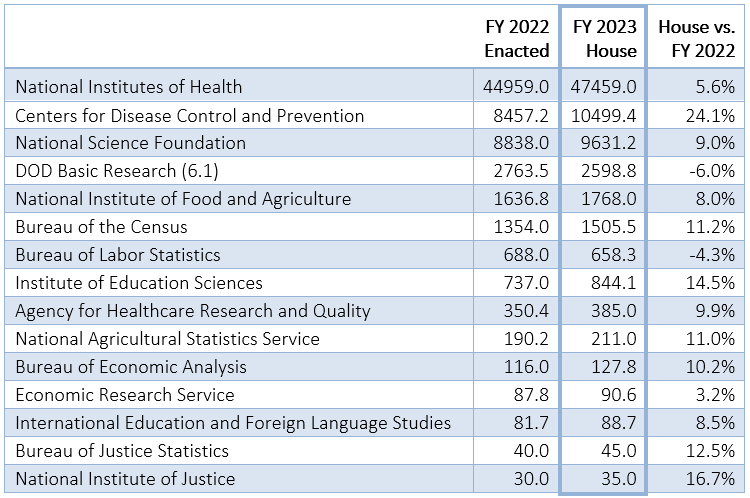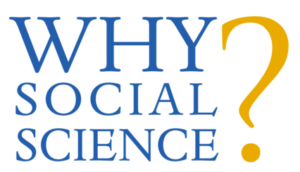Issue 13 (July 5)
COSSA Releases Analysis of FY 2023 House Appropriations Bills
Over the last few weeks, the House Appropriations Committee began considering its annual spending bills for fiscal year (FY) 2023, including the bills that fund federal science, research, and data activities. In some cases, the House proposals mirror priorities laid out in the President’s FY 2023 budget request. However, in most cases, funding allocations did not allow House appropriators to include the sizeable increases sought by the Biden Administration. Still, achieving increases in a funding environment that continues to be impacted by a global pandemic is an important feat.

Lawmakers have just three more weeks of work in July before leaving for the month-long August recess. House leaders are likely to try to schedule votes on as many of the bills as possible before then.
Of course, this is just half the story. The Senate Appropriations Committee has yet to consider any of its annual spending bills. In addition, many of the proposals in the House Democrat’s bills are considered dead on arrival in the highly divided Senate, especially with respect to defense spending levels. The path to completion is anything by straightforward.
However, one thing that could help lawmakers get to a deal on FY 2023 funding before the end of the year is the upcoming retirements of notable Appropriators, who will be looking to secure their legacies through enactment of the FY 2023 spending bills, presumably by the end of calendar year 2022. These dynamics coupled with the upcoming midterm elections will make for an interesting fall and ending to the FY 2023 appropriations process. COSSA will continue to report on these and other developments as the process unfolds.
Read on for COSSA’s analysis of the House FY 2023 funding bills for federal agencies and programs important to the social and behavioral science research community.
COSSA Running “Why Social Science” Series Spotlighting Research on Gun Violence
Friends,
The statistics surrounding gun violence in America are staggering and the policy solutions varied. Recent tragedies in Uvalde, TX and at a grocery store in my hometown of Buffalo, NY—not to mention the countless other shootings that have occurred since then—underscore just how pervasive this crisis is, regardless of where you live. The institutions long-considered “safe spaces”—schools, hospitals, houses of worship—are no longer safe from the scourge of gun violence.
Mass shooting events are just one piece of this social and public health crisis. Everyday across the country families and communities are being rocked by gun violence, from suicide by gun to violence between domestic partners to tragedies stemming from improper storage of firearms in the home. While not all fatal, these experiences leave lasting effects on the communities in which they occur, changing countless lives forever.
What can we do to address a challenge as big and complex as gun violence in America?
The social and behavioral sciences provide an evidence base that allows us to better understand the many factors contributing to gun violence and inform policy or other solutions. Over the next few months, Why Social Science? will spotlight what social science research can tell us about gun violence—conditions that can lead to it, its effects on those involved, and possible solutions informed by science.
I invite you to read—and share—these posts within your own communities, starting with this first contribution by Dr. Rebecca Cunningham, Vice President for Research at the University of Michigan and leading expert on firearm injury prevention and public health.
By shining a light on the contributions of social and behavioral science, we hope to present a fuller picture of this complex issue and share insights and expertise that can help move the conversation forward… hopefully to a safer future.
Thank you, social scientists, for all you do.

Wendy Naus
Proud Buffalonian
COSSA Executive Director
#whysocialscience
University of Michigan’s Rebecca Cunningham Answers “Why Social Science?”

This week’s Why Social Science? post comes from Rebecca Cunningham, M.D., who writes about the role social scientists may play in reducing firearm injury through advising on policy changes and building an evidence base. The post is the first in a series spotlighting research on gun violence and firearm injury in the Why Social Science catalog. Read the post here.
Joan Sereno Named to Lead NSF’s Behavioral & Cognitive Sciences Division
Last month, the National Science Foundation (NSF) announced the appointment of Joan Sereno as the next Division Director for the Behavioral and Cognitive Sciences (BCS) within the Directorate for Social, Behavioral and Economic Sciences (SBE). Sereno, a psycholinguist who will be coming to NSF as a rotator, is co-director of the Phonetics and Psycholinguistics Laboratory at the University of Kansas and chair of KU’s linguistics department. As BCS lead, Sereno will oversee the division’s research programs in cognitive science, anthropology, geography, psychology, and linguistics, among others. She will start in her NSF post on August 29, succeeding Marc Sebrechts who led BCS since 2018.
NSF To Hold Webinar Exploring the Science and Engineering Indicators
On July 14, the National Science Foundation (NSF) will be hosting an interactive webinar discussing the 2022 iteration of the Science and Engineering Indicators, the congressionally mandated report released every two years with data on the health and strength of the U.S. science and engineering enterprise. The webinar will feature Principal Deputy Director for Policy at the White House Office of Science and Technology Policy (OSTP) Kei Koizumi, Vice Chair of the National Science Board Victor McCrary, and Director of the National Center for Science and Engineering Statistics (NCSES) Emilda B. Rivers as panelists and Director of Science, Technology, and Innovation Analysis at NCSES Amy Burke as moderator. The panel will discuss the data and resources that are publicly available in the report and how they can be best used to inform policy and decision making. Registration for the webinar is available here.
National Academies Seeks Nominations for Committee on Misinformation
The Board on Science Education (BOSE) of the National Academies of Sciences, Engineering and Medicine (NASEM) is launching a consensus study that will examine misinformation about science, and is seeking nominations for committee members, reviewers, and participants. The ad-hoc committee will be compromised of approximately 12-14 members and will examine evidence to define and map the landscape of misinformation, examine the mechanisms and impacts of misinformation experienced by diverse communities, examine the effectiveness of existing interventions, and provide a roadmap to guide future research. BOSE is looking for volunteers who are experts in the fields of science communication, psychology, political science, health communication, history of science, ethics, network science, and science communication practitioners. The deadline for nominations is July 15, 2022, and nominations can be submitted here.
COSSA Welcomes San Diego State as a New Member
COSSA is excited to welcome San Diego State University as its newest member! A research university in San Diego, SDSU receives over $14 million annually in federal social and behavioral science funding. COSSA’s full membership list can be found here. Information on how to join is on the COSSA website.

